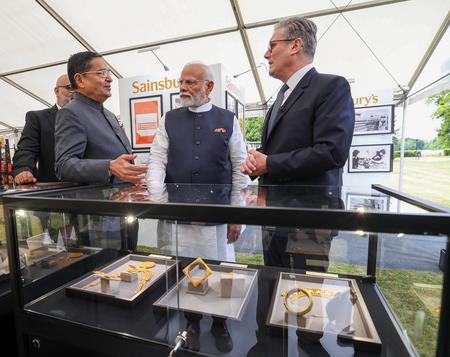
India Reaffirms Commitment For A Robust IP Regime In UK Trade Talks
The Department for Promotion of Industry and Internal Trade (DPIIT) and the Department of Commerce, in collaboration with the Centre for Trade and Investment Law (CTIL), organised a seminar on“Demystifying the IPR Chapter in the India–UK CETA” here.
Policymakers, domain experts, academia and industry representatives deliberated on the opportunities and concerns related to the Intellectual Property Rights (IPR) provisions of the India–UK Comprehensive Economic and Trade Agreement (CETA).
Experts underlined that the IPR chapter strikes a careful balance between fostering innovation and ensuring access.
The panels dispelled several myths surrounding the agreement and clarified that the IPR chapter does not curtail India's policy space.
“Instead, it reinforces India's ability to frame rules in line with its developmental priorities. It was also underlined that the chapter reflects India's existing legal framework while sending a positive signal to global partners and investors about the country's commitment to a robust and forward-looking IP regime,” according to a ministry statement.
It was emphasised that the provisions reinforce safeguards for public health while modernising India's IP framework.
Participants reiterated that voluntary licensing continues to be the preferred industry practice, while the flexibilities relating to compulsory licensing and public health, as enshrined in the Doha Declaration, remain fully preserved.
According to the ministry, concerns over harmonisation of patent processes were addressed, with experts clarifying that these are procedural improvements that in no way affect India's regulatory autonomy.
Geographical Indications (GIs) emerged as a significant area of opportunity, with provisions in the agreement enabling stronger protection of Indian GIs in the UK market - an important step to boost exports and enhance India's cultural branding globally.
Industry representatives highlighted that this would benefit startups, MSMEs and traditional producers alike.
“The IPR chapter of the India–UK CETA provides a template for future trade negotiations - combining regulatory rigour with flexibility, supporting innovation while safeguarding access, and strengthening India's position in the evolving global trade landscape,” according to the official statement.
-IANS
na/

Legal Disclaimer:
MENAFN provides the
information “as is” without warranty of any kind. We do not accept
any responsibility or liability for the accuracy, content, images,
videos, licenses, completeness, legality, or reliability of the information
contained in this article. If you have any complaints or copyright
issues related to this article, kindly contact the provider above.

















Comments
No comment